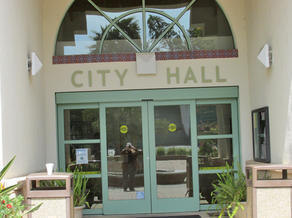Avalon Mayor Anni Marshall supports development impact fees; the Catalina Island Company opposes them. She sees development fees as a way to pay to maintain infrastructure. Island Company representatives see them as an obstacle to growth.
City staff is expected to bring the subject back to a future City Council meeting after reaching out again to the Island Company and anyone else who has a stake in the issue. The council discussed development impact fees at last week’s regular meeting, but took no action after Island Company representatives requested a delay.
Karl Schmeck of the Island Company said in a phone interview this week that the company is working with City Manager Denise Radde to schedule a meeting of the Island Co., and other stakeholders to discuss the issue.
In another phone interview, Marshall said nobody (other than the Island Co.) else has shown up at city meetings on the subject.
On Tuesday, Aug. 20, the City Council held a public hearing to receive comments on a consultant’s recent development fee study and adopt several ordinances that would have added development impact fees to the city code.
Assistant City Manager Michael Parmer, who presented the staff report, said that to adopt development fees, cities must identify the purpose of the fee and the use of the revenue from the fee. According to Parmer, cities must determine a reasonable relationship between the fee’s use and the type of development.
According to Parmer (and the study by consulting firm Michael Baker International) the fees would be charged on a per-unit basis for a development project.
According to Parmer, the city can waive and reduce fees in specific instances.
According to City Attorney Scott Campbell, if there was a development agreement, it would come before the council as an ordinances.
In response to a question from Council Member Oley Olsen, Assistant City Manager Parmer said some cities base development fees on square footage.
Resident Leslie Warner said she favored development impact fees. She said she would prefer the fees be based on the number of bedrooms rather than square footage. “If you go by square footage, you don’t know how many people are going to be in there,” she said.
Campbell said the report was based on dwelling units. According to Campbell, if the council wanted to change the basis of the proposed development fees, staff would have to come back to the council with those proposed fees.
Rob Walker of the Island Company said that while the company agrees that developers should offset a fair share of costs, the development fees before the council that night were not an appropriate solution for the island community. He said the fees were adopted, the council risked slowing economic growth worsening the housing crisis, and pushing the burden of infrastructure costs on to Island residents.
Karl Schmeck followed Walker to the podium to address what Schmeck described as the Island Company’s concerns: He said the proposal was a “special tax” that would affect the abilty of business to grow. He said the study relied on “overly robust projections” of visitor counts and residential growth. He said the cost would be passed along to buyers, renters, and residents, while making the cost of a Catalina vacation a pricier proposition. He said additional housing costs would exacerbate the hurdles to living on the island.
Marshall asked staff if someone built a 150-unit building, would the city only get revenue from building permits.
City Attorney Campbell said if that were to happen, the city would require a development agreement.
Marshall then asked the Island Company representatives “how do we pay for all the infrastructure and everything we need to do and the stuff we need money for now?”
“Do you have some suggestions?” she asked.
Schmeck suggested that development agreements are part of almost all projects of any scale.
As for the proposed development fees, according to Schmeck said they had permanent implications for all businesses, not just the Island Company.
“Again, you don’t have solutions for how to solve our long term problems,” Marshall said.
“We need a dialog,” she said.
Schmeck said he agreed with the need for a dialogue. He suggested a workshop to determine a way to become sustainable. He also suggested a task force made up of businesses on the Island.
Campbell said in developing the fees, the city had held study sessions.
Marshall said there were not a lot of land holders on the Island.
Schmeck said the Island Co. would bear the brunt of the proposed fees, but it would affect other businesses.
Marshall said that maybe poeple who were watching the Aug. 20 meeting will get more interested “because they really haven’t come out and said anything.”
Marshall suggested that the Island Company speak with other stake holders.
City Manager Denise Radde said staff would reach out to the Island Company and anyone else they could think of about the issue. She said she did not want to spend money on a new study.











